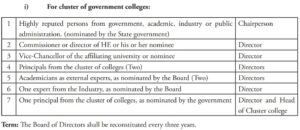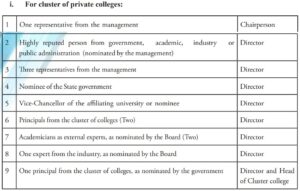India & World UpdatesHappeningsBreaking News
UGC recommends clustering of colleges for multidisciplinary learning, issues guidelines
UGC publishes “Guidelines for Transforming Higher Educational Institutions in to Multidisciplinary Institutions”

way2barak, Sept.3: The University Grants Commission (UGC) has finalised “Guidelines for Transforming Higher Educational Institutions in to Multidisciplinary Institutions”. These aim to help State governments and universities frame appropriate rules and policies. In the guidelines, UGC has prescribed three different approaches which include “clustering” of establishments located in proximity to each other.
 Single-stream institutions and multidisciplinary institutions with poor enrollment, due to lack of employment-oriented, innovative multidisciplinary courses and lack of financial resources to maintain and manage the institutions can improve enrolment by becoming members of cluster and by offering multidisciplinary programmes. The clustering of colleges may help in securing good grades in NAAC accreditation.
Single-stream institutions and multidisciplinary institutions with poor enrollment, due to lack of employment-oriented, innovative multidisciplinary courses and lack of financial resources to maintain and manage the institutions can improve enrolment by becoming members of cluster and by offering multidisciplinary programmes. The clustering of colleges may help in securing good grades in NAAC accreditation.
 Transforming all HEIs into large multidisciplinary institutions, the existing colleges operating in the same campus or in close proximity can form a cluster. This will ensure that colleges with poor enrolment and fewer resources can offer multidisciplinary programmes and can have access to better facilities for the benefit of all. The cluster colleges shall aim at making the courses more dynamic through collaboration with other universities, prestigious government institutions and reputed industrial houses and also avail of the courses offered in the online and ODL mode. In the case of private colleges forming a cluster, the trust, or society, or company which runs the college must be charitable and not-for-profit bodies.
Transforming all HEIs into large multidisciplinary institutions, the existing colleges operating in the same campus or in close proximity can form a cluster. This will ensure that colleges with poor enrolment and fewer resources can offer multidisciplinary programmes and can have access to better facilities for the benefit of all. The cluster colleges shall aim at making the courses more dynamic through collaboration with other universities, prestigious government institutions and reputed industrial houses and also avail of the courses offered in the online and ODL mode. In the case of private colleges forming a cluster, the trust, or society, or company which runs the college must be charitable and not-for-profit bodies.
 The member colleges in a cluster will continue to function as affiliated colleges under the university in the initial phase during which they will share their resources to offer programmes and guide student research projects. After the initial years, the affiliating university may affiliate the cluster of colleges as a single unit during which they will pass through graded autonomy before developing into an autonomous degree-granting cluster of college. These can then later evolve into Research or Teaching Universities.
The member colleges in a cluster will continue to function as affiliated colleges under the university in the initial phase during which they will share their resources to offer programmes and guide student research projects. After the initial years, the affiliating university may affiliate the cluster of colleges as a single unit during which they will pass through graded autonomy before developing into an autonomous degree-granting cluster of college. These can then later evolve into Research or Teaching Universities.
 The cluster colleges will have the following characteristics:
The cluster colleges will have the following characteristics:
• Students can take up the study programme partly in the parent institution and partly in the partnering institution(s) in the cluster.
• There shall be an Academic Council and Finance Committee for the academic and finance related matters of the cluster colleges.
• The cluster colleges will continue to be affiliated to the university concerned. Admission, examination, result and degree will be awarded as per the rules and regulations of the affiliating university
• Financial resources will be pooled to ensure that money is utilized for the holistic growth of students.
• All facilities under the colleges, such as housekeeping, security services, library, sports, laboratories, parking, ground and classes will come under the umbrella of a common pool, which will again benefit all students on the campus.
• Facilities in individual colleges can be put to optimum utilization for the overall benefit of students in the cluster. This will also ensure that the expenditure on separate resources is curtailed and a common pool can benefit all the students.
• Through the clusters, restructured degree programmes with skill courses, internships and community service, among others, will become easier and will increase the students’ job-oriented skills.
• The existing colleges will continue to function as per prevailing norms.
• There will be no change in the recruitment, appointment, allowances, service rules and pension schemes of the teaching and non-teaching staff of the colleges.
• The State governments will continue to provide the same funds to government- aided colleges as they had been doing before the cluster formation.
The UGC also suggests capacity-building for faculty so that they can teach, train and research in multi-disciplinary academic programmes such as through initiatives like Annual Refresher Programme in Teaching (ARPIT) as well as investment in learning assessment tools. It has also harped on setting up Education Departments in universities and colleges that will teach curriculum design, pedagogy, communication and writing to future teachers.
For the smooth functioning of cluster colleges there shall be a Board of Directors as per the following
composition:


Role of the State government:
Given the size of our Higher Education System and the variety of HEIs with many single-stream institutions, it may not be viable to introduce multidisciplinary education in all HEIs simultaneously. Therefore, for all HEIs to plan to become multidisciplinary institutions, a hub and spoke model where a certain number of HEIs will be identified as the hub institutions and transform them into multidisciplinary institutions. These ‘hub’ HEIs can, in turn, develop a specified number of ‘spoke’ institutions. Over some time, they will have a rapid multiplier effect so that by 2030 there will be at least one large multidisciplinary HEI in or near every district.
Click Here to Read Detail UGC Guidelines on Clustering of Colleges




